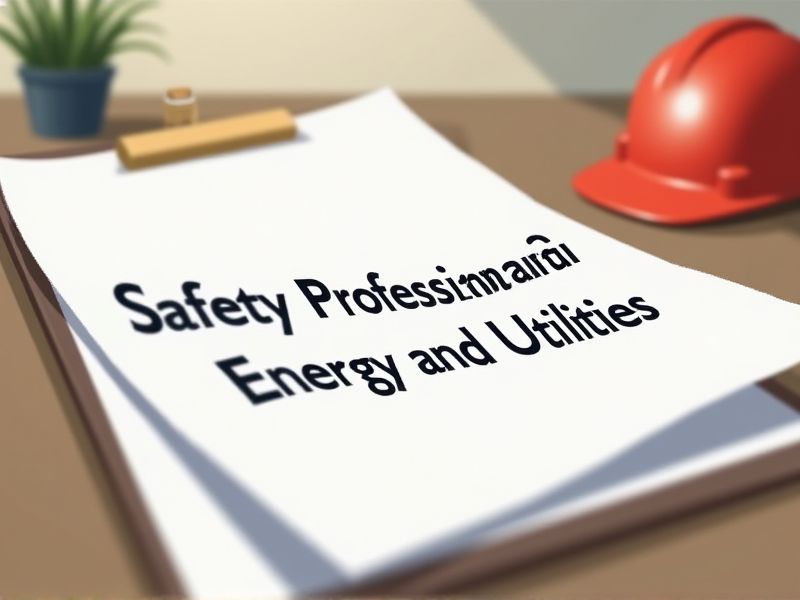
In the energy and utilities sector, safety professionals are tasked with mitigating high risks inherent in operations involving electricity, gas, and other potentially hazardous elements. Specific certifications ensure these professionals possess the requisite knowledge and skills for hazard identification, risk assessment, and implementing safety protocols. Regulatory compliance and industry standards necessitate that safety personnel are certified to maintain a safe working environment and reduce liability. Here are some important certifications needed for safety professionals in energy and utilities.
Certified Safety Professional (CSP)
Obtaining a Certified Safety Professional (CSP) certification ensures safety professionals in the energy and utilities sector have met rigorous standards of knowledge and competence. This certification helps reduce workplace incidents, as it equips professionals with advanced strategies for identifying and mitigating potential hazards. The CSP credential often leads to improved safety protocols and can result in regulatory compliance, which is crucial for avoiding legal and financial pitfalls. Companies may recognize CSP-certified individuals as valuable assets, potentially leading to career growth opportunities.
Associate Safety Professional (ASP)
The energy and utilities sectors involve complex operations and equipment, making the role of an Associate Safety Professional crucial for ensuring workplace safety. Rigorous safety standards must be upheld to prevent accidents and minimize risks, which ASP certification helps enforce. Certification equips safety professionals with current industry knowledge and practices, leading to more effective hazard assessment and management. The presence of ASP-certified professionals often correlates with improved compliance with regulations and fewer workplace incidents.
NEBOSH International General Certificate in Occupational Health & Safety
The NEBOSH International General Certificate equips safety professionals in the energy and utilities sector with crucial knowledge of risk management and international safety standards. By understanding hazard control, professionals can implement effective safety measures, reducing workplace accidents and ensuring compliance with legal regulations. The certificate enhances communication skills, enabling professionals to effectively convey safety policies and procedures. As energy and utilities involve complex machinery and processes, having a structured safety framework minimizes operational risks, safeguarding both the workforce and infrastructure.
OSHA 30-Hour Training Certification
Employers in the energy and utilities sectors prioritize OSHA 30-Hour Training Certification to ensure compliance with federal safety standards, thus reducing legal risks. This certification equips safety professionals with comprehensive hazard identification skills, essential for mitigating workplace accidents in high-risk environments. Workers with this certification are often more attractive candidates, contributing to a safer work culture and improved team morale. Certified professionals can implement effective safety protocols, also decreasing incident-related downtime and associated costs.
Certified Industrial Hygienist (CIH)
The presence of a Certified Industrial Hygienist (CIH) is essential in the energy and utilities sector because of the rigorous need to assess and control occupational health risks. Hazardous exposures like chemicals, noise, and particulates are prevalent, and a CIH specializes in evaluating and mitigating these threats. Ensuring regulatory compliance mandates expert guidance in navigating standards, which a CIH provides. Effective risk management reduces the likelihood of workplace illnesses and injuries, improving productivity and safety.
Construction Health and Safety Technician (CHST)
Construction Health and Safety Technicians (CHST) play a crucial role in the energy and utilities sector by ensuring compliance with rigorous safety regulations, reducing the risk of workplace incidents. Their expertise in identifying hazards and implementing safety protocols leads to enhanced protection for workers and assets. With energy and utility projects often involving complex, high-risk environments, CHSTs contribute to minimizing downtime and associated costs due to accidents. Their involvement in proactive safety management fosters a culture of safety, crucial for maintaining project timelines and safeguarding human lives.
Certified Hazardous Materials Manager (CHMM)
The presence of a Certified Hazardous Materials Manager (CHMM) ensures effective management of hazardous materials, reducing potential risks in energy and utility operations. Regulatory compliance is crucial in these industries, and a CHMM brings expertise to meet and maintain these standards. Proper handling and disposal of hazardous materials by a CHMM decrease the likelihood of environmental contamination. A CHMM contributes to creating a safer workplace, minimizing accidents and improving overall safety culture.
Process Safety Management (PSM) Certification
Process Safety Management (PSM) Certification equips safety professionals with specialized knowledge crucial for handling hazardous processes in energy and utilities sectors. Without this certification, the risk of accidents stemming from process failures increases, jeopardizing both worker safety and operational continuity. Regulatory bodies often mandate PSM standards to ensure organizations systematically analyze and mitigate process-related hazards. Employers prefer certified professionals, as it demonstrates a commitment to maintaining industry safety standards and reducing potential liabilities.
Confined Space Entry Certification
Confined Space Entry Certification ensures safety professionals can identify and mitigate potential hazards such as toxic gases, oxygen deficiency, and restricted movement. It provides them with the necessary skills to implement and enforce regulatory standards, reducing workplace accidents and fatalities. Certified professionals become knowledgeable in emergency response techniques, critical in scenarios where quick action can save lives. Energy and utility industries involve complex environments where confined spaces are common, making specialized training essential for safe operations.
Lean Six Sigma Green Belt Certification
Lean Six Sigma Green Belt Certification equips safety professionals in the energy and utilities sector with tools to enhance process efficiency, which directly mitigates risks and hazards. Data-driven problem-solving approaches reduce the likelihood of accidents and equipment failures. Cost reduction through improved process efficiency leads to resource reallocation for additional safety measures. Structured methodologies foster a culture of continuous improvement, which is crucial in maintaining safety standards.
Summary
When you, as a Safety Professional in Energy and Utilities, acquire certifications, your credibility and job prospects enhance significantly. Certifications equip you with advanced knowledge and skills, leading to improved workplace safety and compliance with industry standards. Employers often recognize certified professionals as more competent, which can lead to career advancement and higher salary potential. As a result, workplaces under your supervision usually experience reduced accident rates and increased trust from stakeholders.
